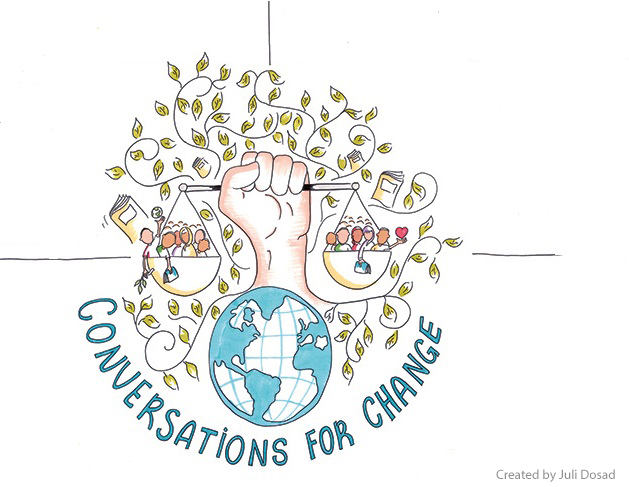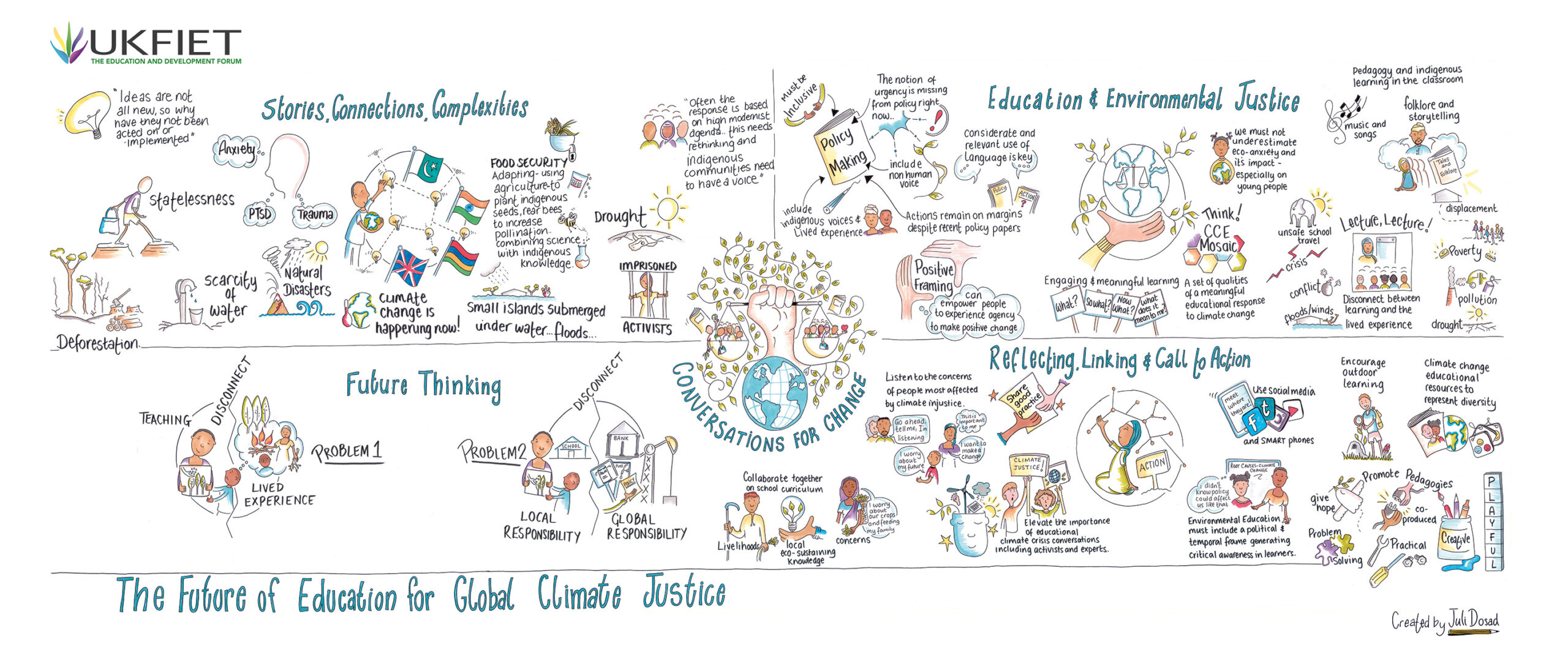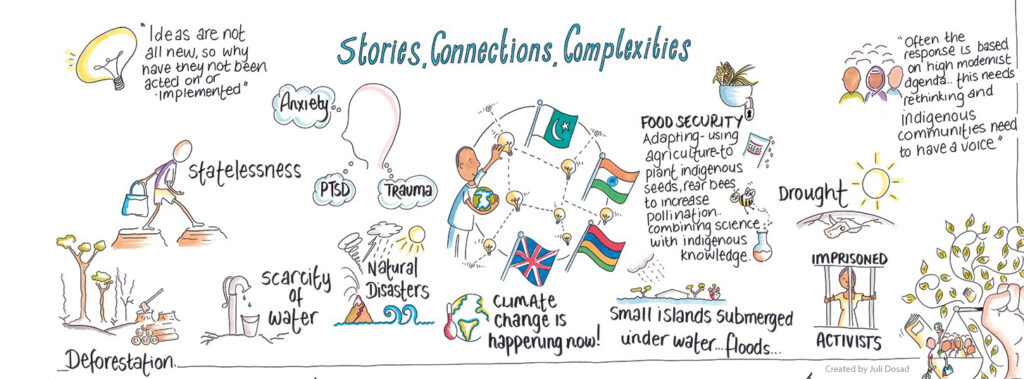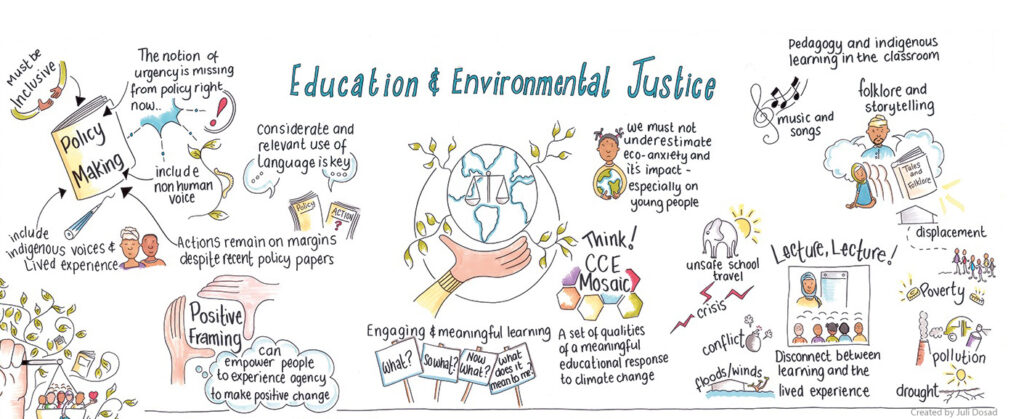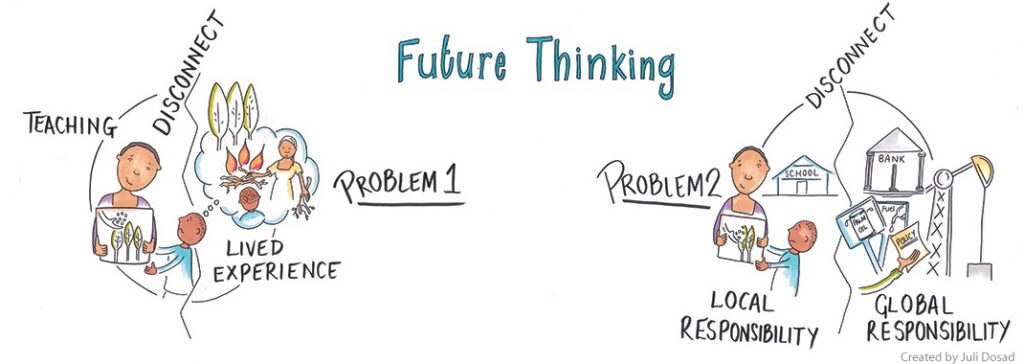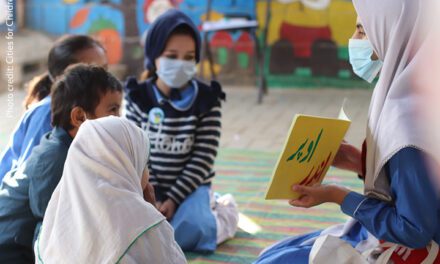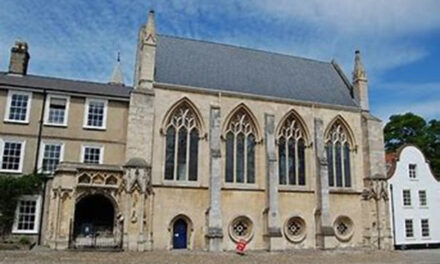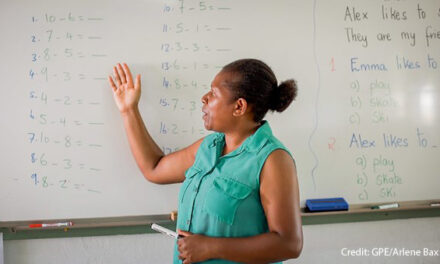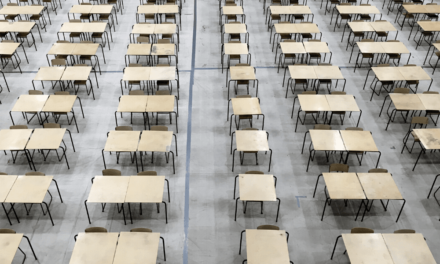‘Conversations for Change: the Future of Education for Global Climate Justice’ was a one day conference hosted by UKFIET in November 2022. It was an opportunity for critical dialogue and collective envisioning for how education can and should be transformed to ensure it remains vital, relevant and equitable in the years to come.
The day was inspired by the ‘Future Creating Workshop’ and ‘Futures Thinking’ methodology, and aimed to generate ideas about how participants wished education to be, rather than dwelling on critiques of existing problems, and to begin to formulate proposals for how to effect the change that is needed. Offered in person and online, the hybrid format enabled activists, NGOs, practitioners, policymakers, academics and donors from across the globe – including where climate crises are most intense – to gather.
The image in this article is a visual recording by Juli Dosad that brings these conversations to life. The day had four distinct parts, with each part representing an important stage of collaboration. In this article, we take a closer look at each stage and share the key insights and points of discussion.
Session 1. Stories, connections, complexities
In the first session we heard powerful stories from activists in India, Pakistan and Mauritius, who brought to life the urgent need for action right now, as those most immediately impacted by climate crisis and injustices.
- A documentary made by filmmakers and activists from Pakistan, Haya Iqbal and Basharat Issa, showed the devastation caused by floods from melting glaciers where people lost their homes within seconds and became displaced, including teachers.
- From Sundarban in India, we heard from Mamta Mudy about the adaptations to livelihoods made by indigenous Adavasi women in response to the salination of freshwater lakes, caused by deforestation; we also heard of the dangers faced by women activists for protesting against their land used for mining minerals.
- From Mauritius we heard from Anshe Mungher, a young activist for Fridays for Future, who spoke out about the rising sea levels that endanger local fishermen, where collective action alleviates eco-anxiety for young people.
Session 2. Education and environmental justice
In the second session of the day, researchers from Kenya (Donvan Amenya, Education Development Trust), Nepal (Ganesh Singh, Tribhuvan University) and England (Kate Greer, University College London) shared insights on how children’s lives and education are being disrupted by climate change, how national governments are addressing climate change in education policies and curricula, and the experiences of teachers and learners in the delivery of environmental education in classrooms.
Many of the critiques that emerged in these presentations and the ensuing discussion are illustrated in the artwork. Presentations and films from the day’s morning sessions can be found here.
Session 3. Future thinking
These two morning events framed an afternoon of workshops of Future Thinking where small groups imagined their utopian visions for climate change, focusing on two key problems that emerged in teachers’ and learners’ experiences of environmental or climate change education in classrooms:
The first problem is the disconnect between what is taught in classrooms and the lived experiences of both teachers and learners when it comes to environmental degradation and climate change. As noted in the previous session, prescriptive policies, curricula and learning materials often do not resonate with local conditions or concerns about human relationships with natural environments.
The second problem is the disproportionate burden of responsibility for environmental action that is often placed upon local actors, including learners themselves, in climate change education, while failing to recognise the burden that should be taken on by state and industry actors.
Participants worked in small groups to design a utopian vision that would address one or both of these challenges. They were encouraged to engage in ‘blue sky thinking’ to imagine alternatives for education that were free from constraints and regardless of the current situation. As employed in the ‘Future Creating Workshop’ method, these visions would be the keystones that would inform future, concrete actions for change (to be addressed in the day’s final session).
Session 4. Reflecting, thinking and call to action
In the final plenary session, we drew together the calls for actions identified from Session 3. Significantly, there was strong consensus that environmental education must address the root causes of climate change, within a political and temporal framing, and unapologetically generate critical awareness in learners.
We envisaged curriculum content as being collaboratively constructed to reflect local knowledges, taught by well trained teachers who teach using creative, playful and problem-solving pedagogies (often beyond classroom walls), and who draw on educational resources that represent diversity and local voices. Consensus was strong around the urgent need to talk constantly about the climate crisis, meeting young people where they are at through the use of social media and smartphones, and for those most affected by climate injustices to be heard first.
Following the event, on the eve of COP27, we published a call for action directed to government leaders.
The organising team:
Ben Durbin, UKFIET, Raspberry Pi Foundation
Rachael Fitzpatrick, Education Development Trust
Laila Kadiwal, UCL
Charlotte Nussey, UCL
Will Smith, Moray House
Jo Westbrook, University of Sussex
Rachel Wilder, University of Bath
See all the resources from the day
You can read other content on the UKFIET website relating to climate change and climate justice here.

